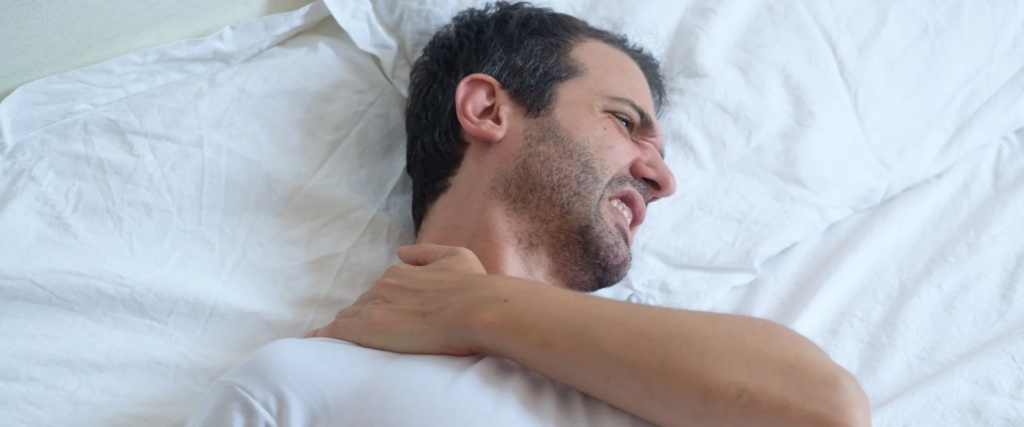If you suffer from chronic nerve pain brought on by conditions such as diabetic neuropathy, physical trauma, sciatica, lupus, arthritis, or any of the other aforementioned conditions, you may discover that your pain is significantly worse throughout the night.
Even though not many people suffer chronic pain, it is usually common for persons who suffer from nervous system disorder or from nerve pain to claim that they have increased pain at night or once they get into bed.
Your pain may make it more difficult for you to get a good night’s sleep, which may, in turn, make your discomfort as well as your general health and well-being even worse. It’s a circle that never ends.
First, let’s investigate the possible causes of your nerve discomfort getting worse at night, and then we’ll look at some potential solutions to help you obtain a better night’s sleep.

Why Nighttime Nerve Pain Is So Much Worse
A number of factors can contribute to chronic pain, and the same is true for nighttime pain. Although not all of the causes have been pinpointed, the following are some hypotheses that could explain why you experience more pain during the night.
Position of the Body
When you are standing, the weight of your body does not exert the same kind of strain on your nerves as when you are lying down. However, when you are laying down, this weight can put pressure on your nerves. This occurs frequently with sciatica and other types of persistent pain that are brought on by pinched or compressed nerves.
Temperature
A better night’s sleep is often achieved by lowering the temperature. However, the cold can also make the discomfort associated with arthritis worse. It is possible that neuropathy will make you more sensitive to cold temperatures and will increase the likelihood that these temperatures will cause you pain.
Attention and Distraction
It’s possible that when there are fewer things to take your mind off the pain, you’re simply more aware of it at night. This does not mean that the pain is not real; it is; nevertheless, it does mean that you may be more aware of it at night than you are during the day when you have other things to keep your mind occupied.
Hormone Levels
The levels of your hormones, as well as your metabolism and a number of other biochemical processes, change as your body gets ready for sleep. It’s possible that some of these shifts will make your pain worse.
One hormone that has been shown to reduce inflammation is cortisol. However, during the first half of your sleep cycle, your cortisol levels drop so that you can rest. Unfortunately, this can make the pain associated with rheumatoid arthritis much more severe.
Timing of Medication Administration and Dosage
It’s possible that the painkillers that work so effectively during the day are starting to lose their effectiveness too quickly in the evening. Or the biochemistry of your body at night may necessitate a different dosage or medication to treat the symptoms.

How to Get a Better Night’s Sleep Despite Chronic Pain
It’s possible that you and your pain management professional will need to try out some experimental methods in order for you to enjoy better sleep. It’s possible that treatments that are effective for one type of chronic pain won’t be as effective for another, and your body will react in its own one-of-a-kind way.
Here are some suggestions for how you can lessen the pain you experience during the night and have a more restful night’s sleep.
Experiment with Sleeping in a Variety of Positions.
Changing the way you sleep can help reduce some of the strain on your nerves if the source of your chronic pain is a pinched nerve or other form of nerve compression. People who suffer from sciatica who favor sleeping on their side, for instance, frequently discover that it is advantageous to sleep with the affected leg elevated while in bed. Those who suffer from hip or knee discomfort can discover that sleeping with a pillow between their legs provides them with some relief.
Make Adjustments to Your House Temperature
When you go to sleep, try shifting between a few different temperatures in the room. It could take some time before you discover the temperature that is just right for you—one that is cool enough to help you sleep but not so cold that it makes your pain much worse. Consider keeping a notebook in which you record the room temperature, the quality of your sleep, and any pain you experience each night. After some time, look for patterns in the data.
Ensure That You Get Enough Exercise Throughout the Day
Exercising throughout the day can help alleviate certain types of chronic pain, and it also has the potential to improve your quality of sleep. Have a conversation with the medical professional who manages your pain about the types of physical activity that are acceptable and risk-free for you.
Develop Some Sleep Healthy Patterns
The stimulations you experienced throughout the day may take your mind off the pain, but they won’t help you get to sleep. Create a pre-sleep ritual that will assist in getting your body ready for rest. Turning off the television and any other screens one to two hours before going to bed, doing something relaxing like reading a book, or soaking in a warm bath are all examples of this. Anything that will help you unwind and relax before you go to bed will be beneficial.
Get Your Thoughts Ready for Some Sleep
The anxiety that comes along with having chronic pain can make it much more difficult to sleep. Try practicing meditation or deep breathing exercises to bring down your stress level and assist lessen the impact of any discomfort you may be experiencing. They also provide you with something else to focus on rather than the agony that you are experiencing.
Contact Specialist at Chronic Therapy on Managing Chronic Pain
Tell your primary care provider if the pain medications you’re taking start to wear off or stop functioning as effectively during the night so you may consider other treatment options with them. For those who suffer from rheumatoid arthritis, for instance, their physician may advise them to take modified-release corticosteroids or medical cannabis to prevent inflammation during the night.
Get Plenty of Rest to treat chronic pain
Do not, under any circumstances, allow yourself to go without sleep while remaining silent. A lack of quality sleep on a consistent basis will only serve to make your chronic pain worse, and it will prevent you from enjoying a higher standard of living. Having less discomfort during the night and sleeping better will help you feel better throughout the day.
You can arrange an appointment at any United Physician Group Pain Management practice if you would like some assistance in managing your pain in order to improve the quality of your rest and overall health. We provide excellent therapies that provide about alleviation that is long-lasting. We will assist you in having a good night’s sleep and regaining control of your life.
Finally
For more information on chronic pain management, pain disorders, chronic pain resources, psychogenic pain, effective chronic pain treatment options or other physical therapy, you should book a consultation session with a specialist at Chronic Therapy today, to give you professional advice that will suit your personal experience.
Also, for people with chronic pain who are constantly worried on how to treat chronic pain or get their chronic pain treated, our specialist at Chronic Therapy have made huge success over the year in recommending reliable resources to manage chronic pain from nerve pain or any other developing chronic pain conditions.



